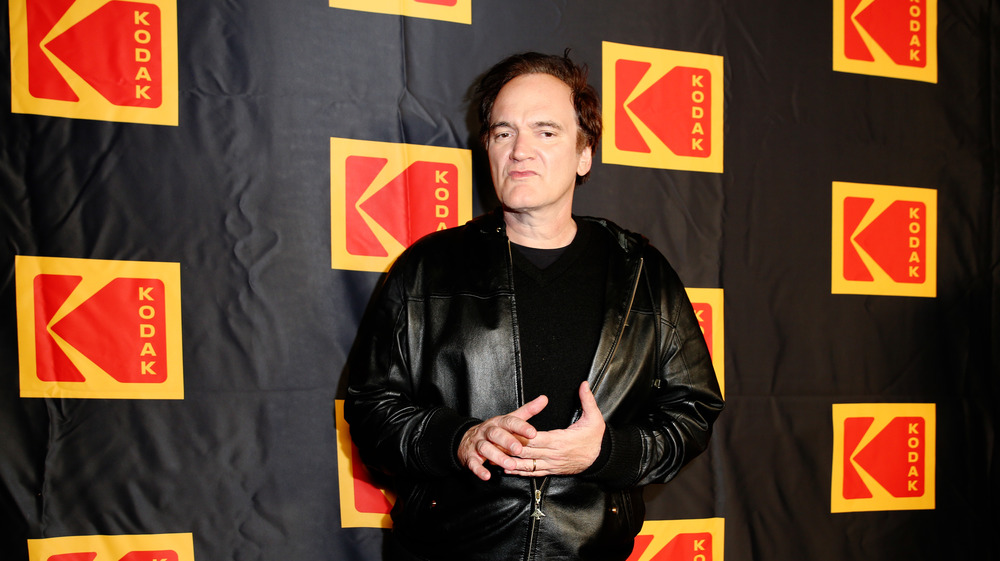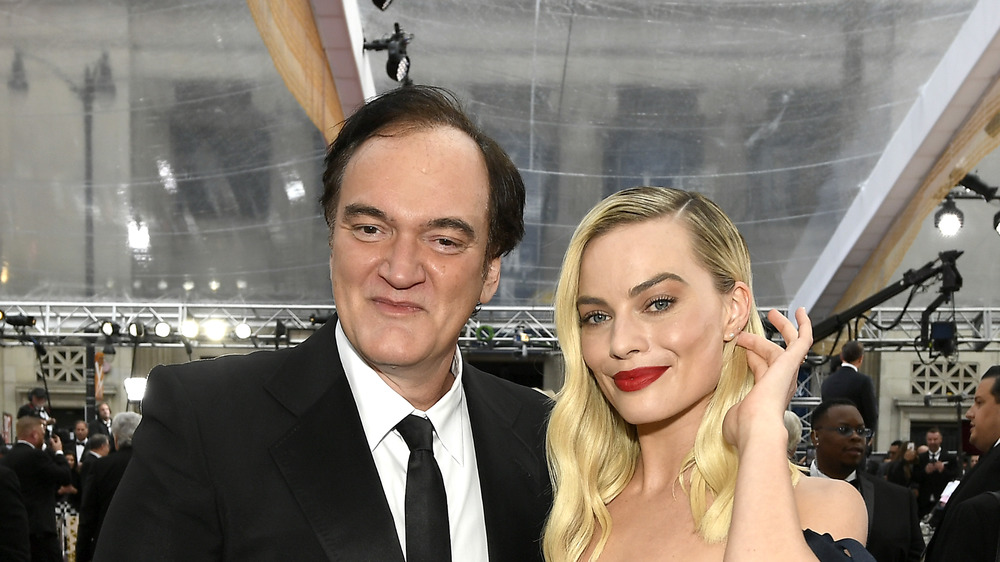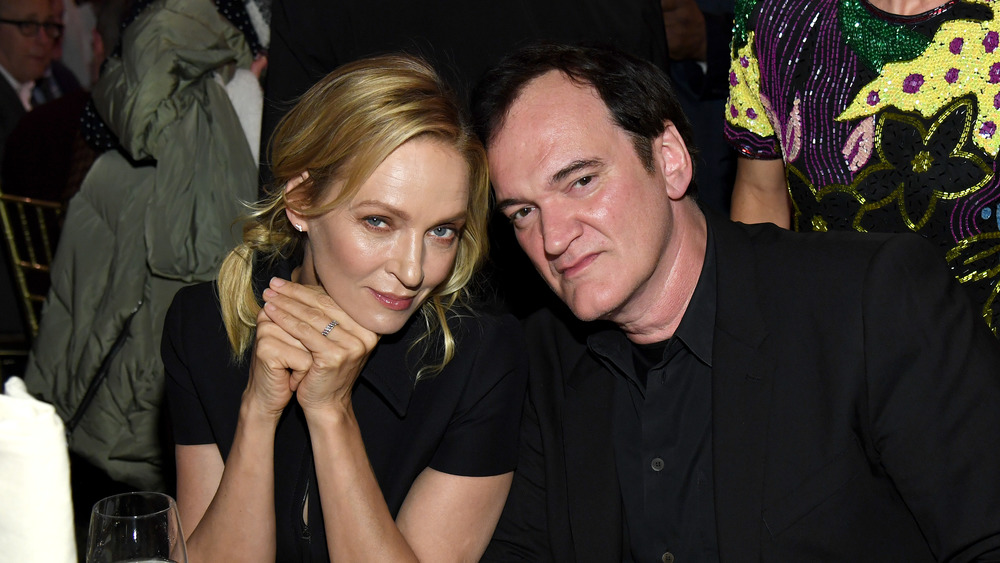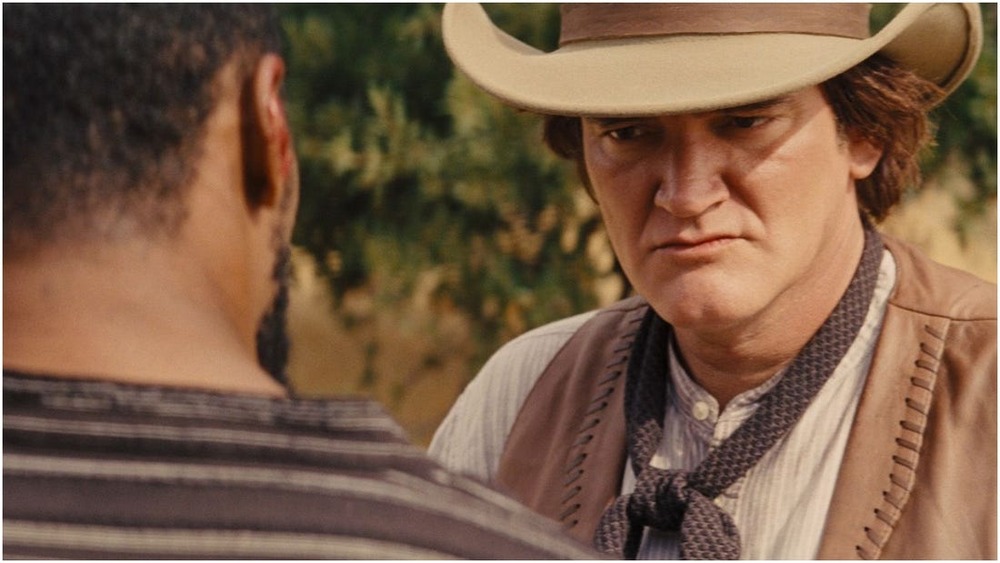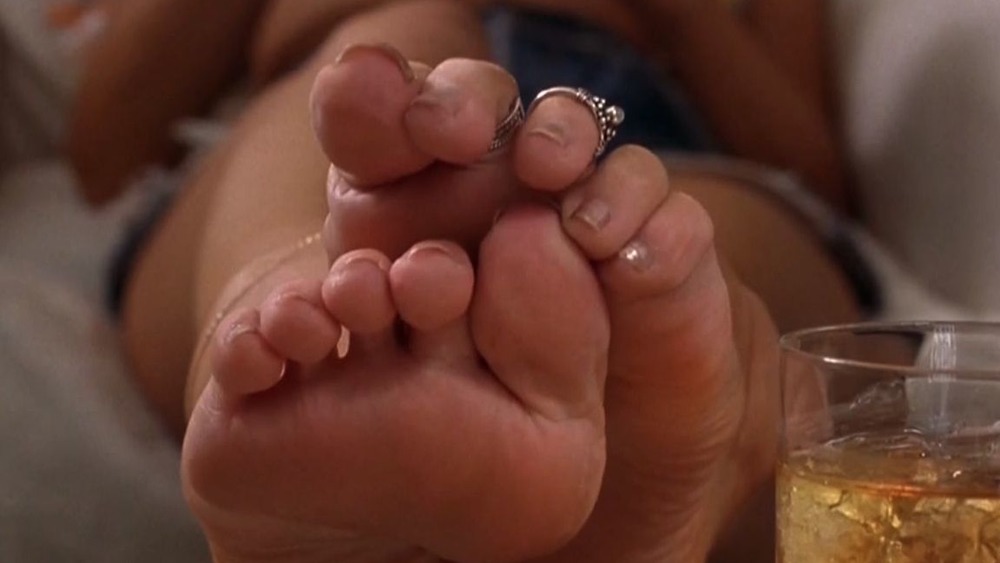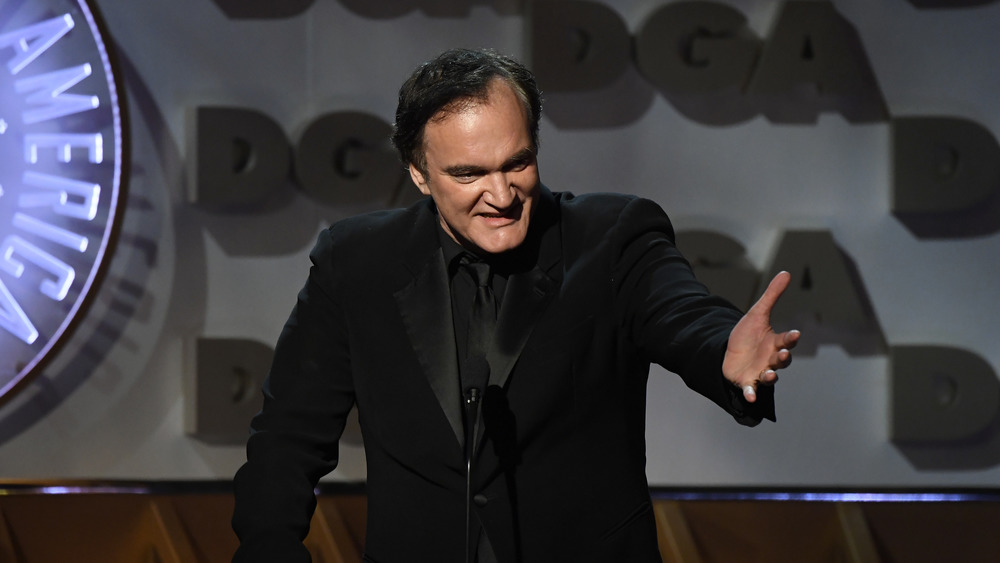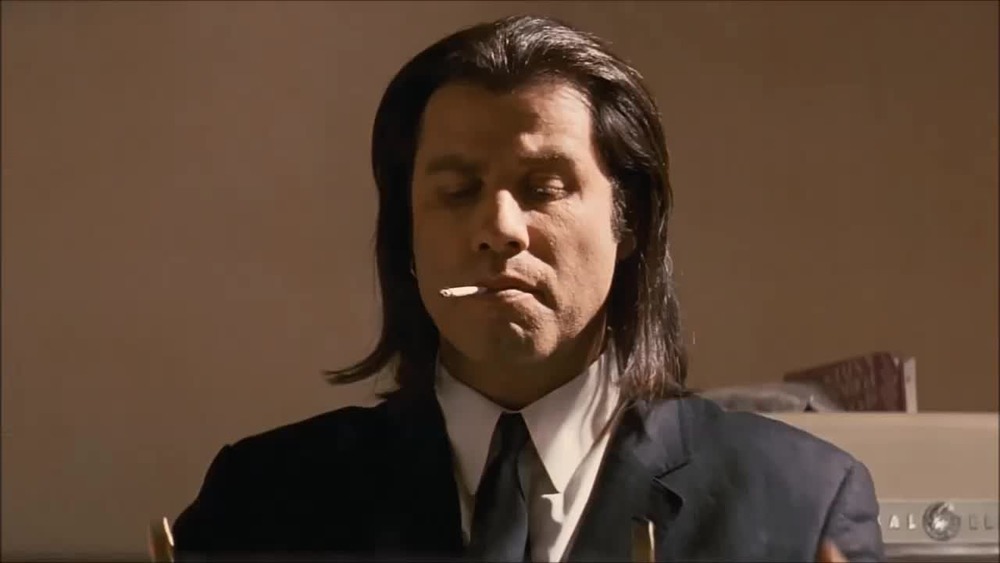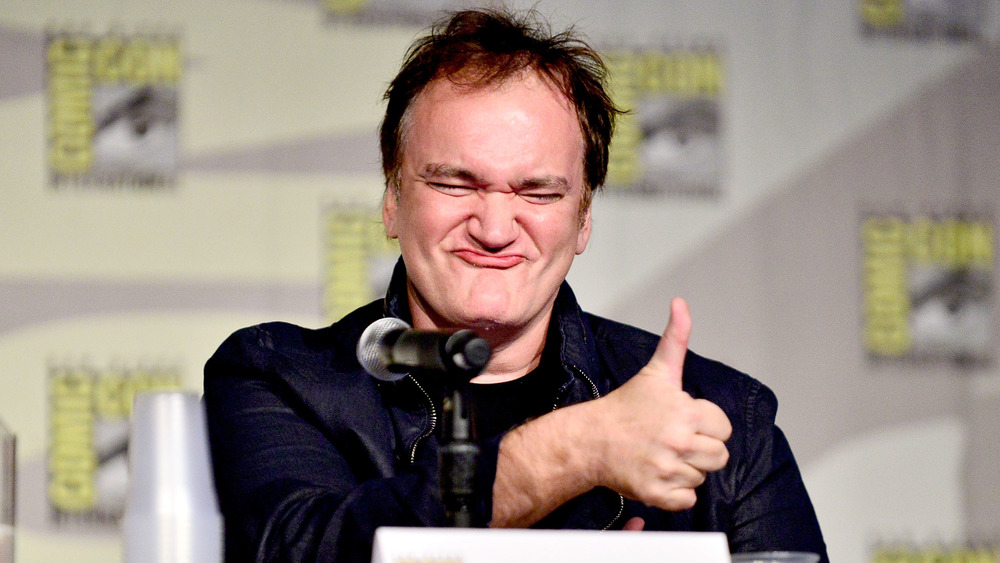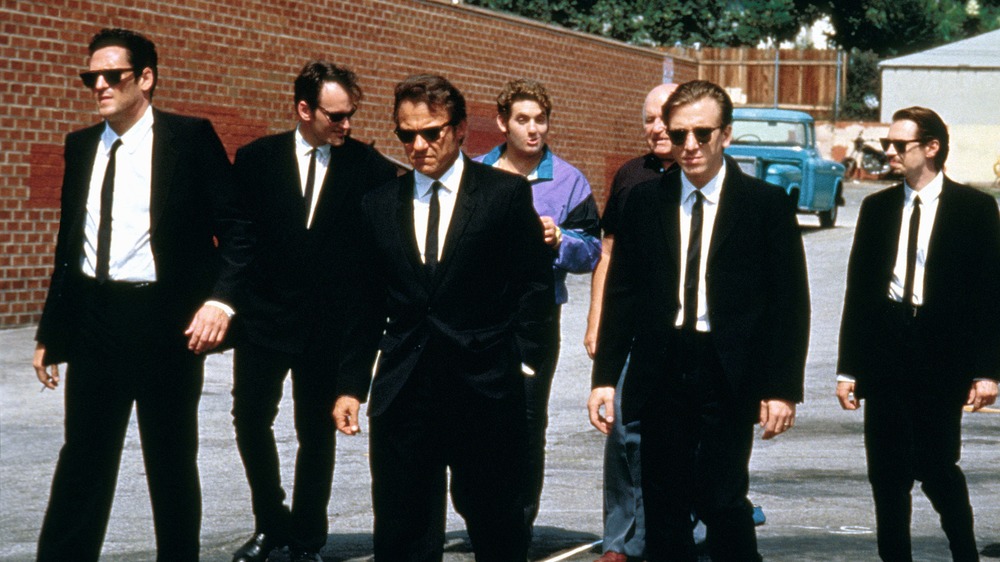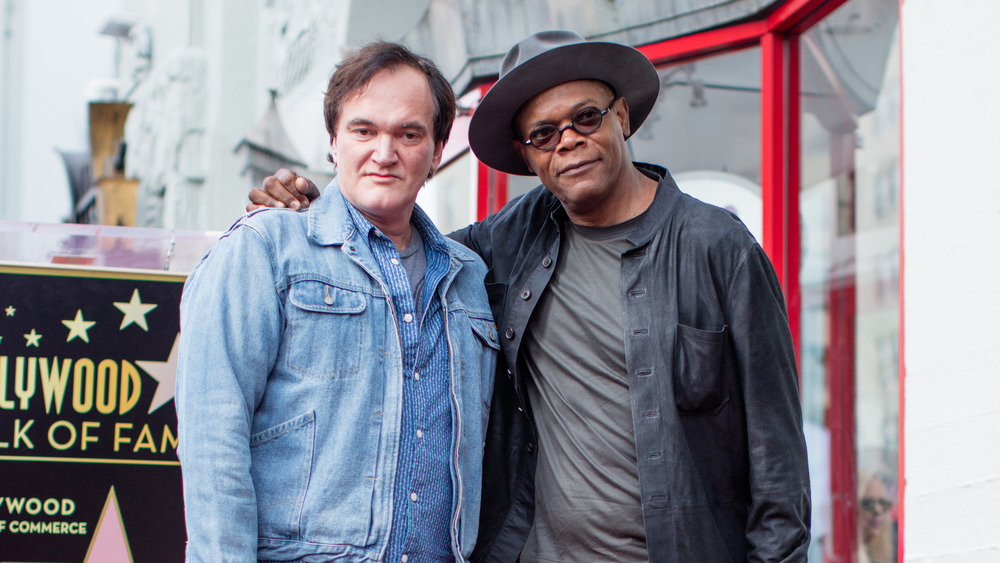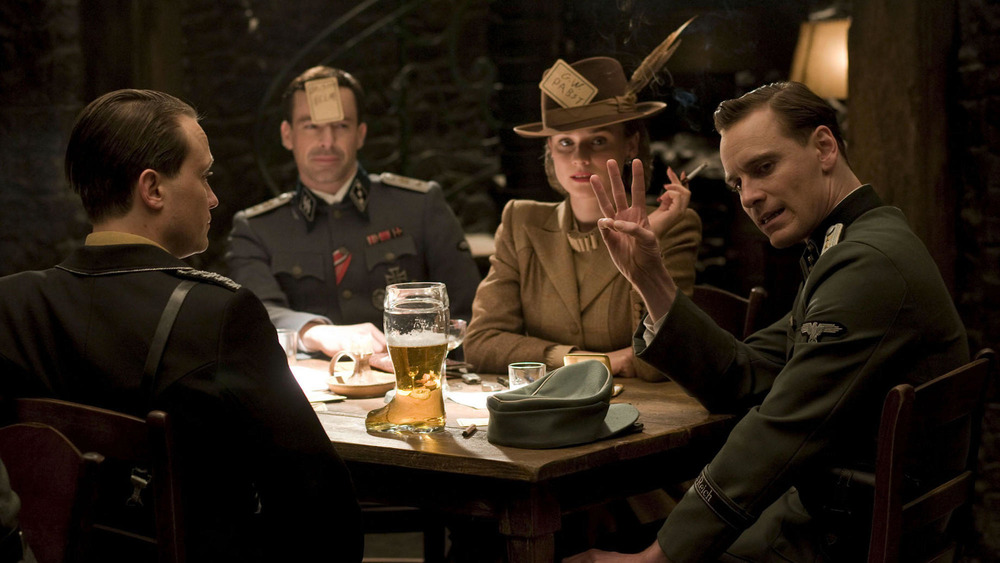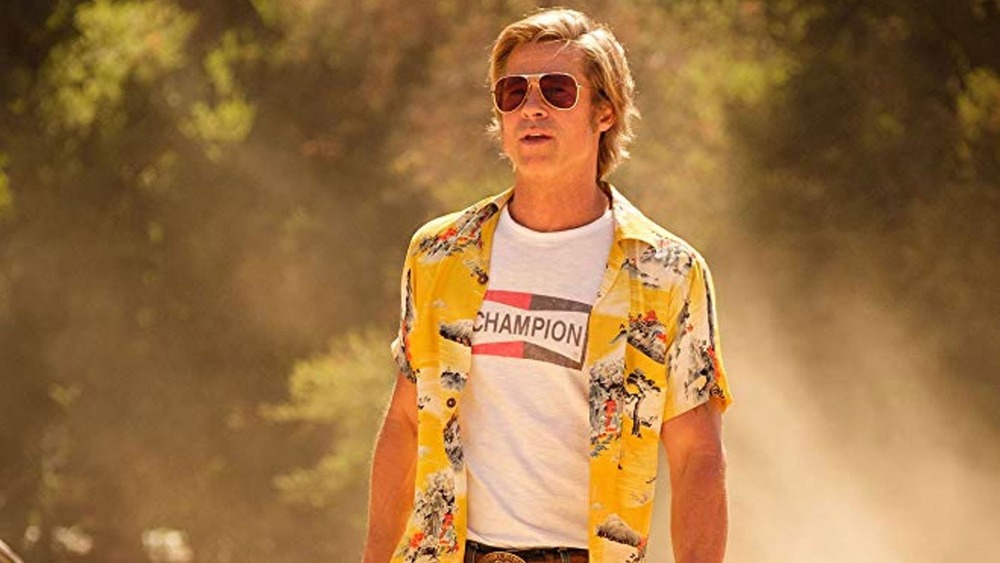Rules Actors Have To Follow In Quentin Tarantino Movies
Quentin Tarantino is one of the most famous American filmmakers still working today. He's become known for a signature style that blends dense, intellectual dialogue with fun genre mashups and a healthy slathering of violence. In interviews, it's clear immediately that Tarantino is someone who is deeply passionate about movies, and loves to talk about them whether they're related to his current project or not. It's that love of movies that has made him one of the most popular directors of his era, and led him to acquire a legion of devoted followers.
The actors who work in Tarantino's movies are a huge part of the success or failure of any one of his projects. At several points in his career, Tarantino has been praised for getting amazing, unparalleled performances out of his actors, and those memorable performances are likely to be a significant part of his legacy. To get those great performances out of actors, though, Tarantino expects certain things from the people that he works with.
No cell phones
The biggest rule that Tarantino has for his sets is that cell phones are not permitted. In the past, Tarantino has been clear about the reason he doesn't want any phones around. "I've done scenes in movies and all of the sudden somebody's cell phone on the crew goes off and ruins the scene. That can't happen," the director explained. "We're here to do something, we're really conjuring up something, and I can't have my actors' acting, or anything that we're trying to do, be messed up by a cell phone. People can say, 'Oh, well I'll remember to put it on silent.' I'm not here to test your memory. We're here to do this. You will screw up everything we're doing."
Tarantino is enthusiastic about the movie-making process, and his only demand is that it not be interrupted. In the modern world, where every person has a cell phone, asking an entire crew of actors and professionals to keep the phone away doesn't seem like an excessive demand.
You may have to do your own stunts
Tarantino is a man who, above all else, is devoted to making great movies. That means that, for the most part, the rules his actors are asked to follow are in service of that larger goal. Sometimes, though, his devotion to great filmmaking can come back to haunt him. The most notorious example of this came during the filming of Kill Bill, when Uma Thurman was involved in a serious car crash after getting behind the wheel to perform a stunt.
Tarantino had insisted that Thurman do the stunt herself, even though she had misgivings about how safe it would be. To his credit, Tarantino apparently felt immense remorse after the fact, and even gave the video of the crash to Thurman so that she could prove her account was accurate. Tarantino understood that the footage could prove harmful for him, but the crash was covered up after the fact, so he felt responsible for ensuring that the true version of events was known. Tarantino may have insisted Thurman do her own stunt, but it seems as if that was a decision he lived to regret.
You may have to work with Tarantino the actor
Although Tarantino's authorial voice is strong in his movies, both thanks to his scripts and because of his directorial eye, the auteur has often written roles for himself as well. Typically, these parts are relatively small, and don't play a major role in the plot. Although his abilities as an actor are somewhat limited, the director and writer is careful about making sure that his cameos don't hurt the momentum of the film he's trying to make.
Tarantino appears on screen in most of his movies, and even when he doesn't, he may show up in scenes where the audience isn't aware that he is actually there. The most famous example of this is in Inglourious Basterds, when Tarantino took over for Christoph Waltz in a scene where Waltz's character was supposed to strangle Diane Kruger's character to death. In the scene, we get close-ups of Kruger's face as she struggles, but the hands in those frames aren't Waltz's, they're Tarantino's.
He may ask you to indulge his foot fetish
Although Tarantino is largely focused on making great movies, those who have watched his movies closely have likely also noticed that he has a certain fondness for feet. The director chooses to film feet whenever possible, and includes shoes and feet in his stories far more than the average director might. Throughout the history of movie-making, directors have always indulged their various kinks and fetishes from behind the camera, and Tarantino is no different.
As an actor on one of his projects, then, you might expect to foreground your feet in a way that feels a little unnatural. Tarantino has also always been very interested in talking about feet. According to Rose McGowan, he brought up the actress's any time he saw her. "Every time he'd see me, he said, [...] 'I can't tell you how many times I used the shot where you're painting your toes!'" the actress told The Guardian. Tarantino can get a great performance out of his actors, but he also has some kinks he frequently works out on screen.
Expect him to be enthusiastic
Actors who work with Tarantino should expect him to have plenty of energy when he shows up on set. In an interview with Yahoo! Entertainment, Jamie Foxx said that he loved working with Tarantino, and described the director as behaving like a "jazz musician" when he's on set.
Of course, Tarantino is notorious for writing extended scripts, so it's not as if he comes into a day of shooting without being prepared. What Foxx is describing is Tarantino's innate skill, which allows him to "feel" the movie being made. He's not cold and calculated. Instead, he's deeply enthusiastic about the work that he's doing, and, at least for some actors, that enthusiasm can be infectious.
In an interview with FAB TV, Brad Pitt echoed Foxx's comments, saying that Tarantino "loves cinema so much, as you know, and loves talking about it...There's a great verve and energy on the set; it's unlike any others."
Tarantino grew up watching and dissecting movies, and when he makes them, he brings the same enthusiasm to set that he had when he was geeking out over movies in his own life. He steals from people he admires, and isn't afraid to get referential. Tarantino's love of movies is a huge part of his success, and it's an energy he apparently brings with him when he shows up to work.
He may cast you in an unconventional role
Many actors relish the opportunity to work with Tarantino, but that doesn't mean that those actors are always cast in the kinds of roles that they normally play. Sometimes, Tarantino intentionally casts an actor to play against their normal persona. The most famous example of this came with the casting of John Travolta as Vincent Vega in Pulp Fiction.
At the time, Travolta was known as a former star who had faded into obscurity. Tarantino reinvented him as a character actor, and proved that he was more capable than many of his detractors may have thought. Throughout his career, he's made casting decisions like that. He cast Brad Pitt as a Tennessee soldier in Inglourious Basterds when he was still widely seen as a heartthrob. He cast Leonardo DiCaprio as a villainous slaveholder in Django Unchained. At every turn, he's called on the actors in his employ to defy expectations in the roles they take on.
Expect to use plenty of foul language
Tarantino has a lot of trademarks, but one of his greatest gifts is his ability to create poetry out of the most vulgar language imaginable. The director doesn't have a monopoly on swearing, but he may be the best writer in the business at seamlessly integrating a variety of foul language into the speech of his characters. For some actors, this vulgarity only serves to improve their performances in his films.
Samuel L. Jackson, one of Tarantino's most frequent collaborators, has a unique gift for spouting vulgar language as if it is occurring to him on the spot. He is likely the best at integrating Tarantino's gift for cuss words into his performances, but he isn't alone. Actors like Leonardo DiCaprio, Brad Pitt, and Kurt Russell have also proven themselves to be adept at making the most vulgar language in Tarantino's scripts sound like it's the only natural way to communicate.
The movie may not fit neatly into a single genre
In the same way that he likes to cast actors in surprising roles, Tarantino also likes to make movies that explode the expectations a person might have about a certain genre. Inglourious Basterds, for example, is a war movie that at various points becomes a spy thriller and something close to a heist movie. Reservoir Dogs, by contrast, is a movie about a heist where the heist is never actually seen on screen.
As an avid movie watcher, Tarantino is aware of the conventions that exist inside certain genres, and frequently delights in blowing them up. Bending the genre this way doesn't work for every writer, but Tarantino has developed the skills and collaborators over the course of his career to pull it off. Actors who work with him regularly know that the movies he makes are never as simple as their taglines may seem to be. There's always more going on just below the surface.
He may ask you to come back for another movie
Over the course of his career, Tarantino has gotten great performances out of a number of actors in a single film. Although he only worked with people like Robert de Niro or John Travolta on one movie, those films proved that he knows how to direct high caliber actors. Meanwhile, there are other acting partners that Tarantino has chosen to return to over and over again over the course of his career.
Samuel L. Jackson is Tarantino's most frequent collaborator, and he's been described as the actor who's most able to handle Tarantino's dialogue. Tarantino has worked with a number of other actors on multiple films as well, including Uma Thurman, Kurt Russell, Brad Pitt, and Leonardo DiCaprio. When Tarantino finds an actor that he likes, he often asks them to return for another project. Sometimes, he'll even write roles that are specifically designed with a certain actor in mind, and because he's Tarantino, he can usually get the actor he's set his sights on.
Expect scenes to change tone on a dime
Tarantino tries to defy expectations with regard to genre, but he also tries to keep audiences on their toes even within a scene. One of the best examples of this comes in Inglourious Basterds, when the movie slows down for a prolonged scene in a German bar. The sequence starts out very friendly, with undercover Allied officers mingling with German intelligence. They even start to play bar games together.
After the cover of the Allied officers is blown, though, things get shockingly violent very quickly. There's a simmering tension underneath the entire scene, but it's also a scene that is at times quite funny. Tarantino plays with that dynamic in order to string his audience along, and usually, he does an incredibly good job of making the tonal shift feel obvious in retrospect. One minute, his characters could be laughing and drinking together. The next, they're at each other's throats, and several of them are dead. That's just part of watching a Tarantino movie.
You'll probably have to kill somebody
Death and killing are enormous elements of the movies that Quentin Tarantino makes. In fact, he has yet to direct a movie in which nobody dies on screen, and it's often the central actors in his stories who are doing the killing. Once Upon a Time in Hollywood, which is Tarantino's most recent movie, is largely nonviolent for most of its running time. That puts it in sharp contrast to most of the director's other work, but even that film can't resist a shocking burst of violence at its climax.
In that climactic scene, members of the Manson family are killed in shocking and often grotesque ways. The scene is just one more reminder that being an actor in Tarantino's world means accepting that you're likely going to commit some murder. Often, Tarantino's headline actors also die on screen as well. Sometimes, though, he grants his protagonists a reprieve, and instead asks that they just kill other characters inside the worlds that he's created.
